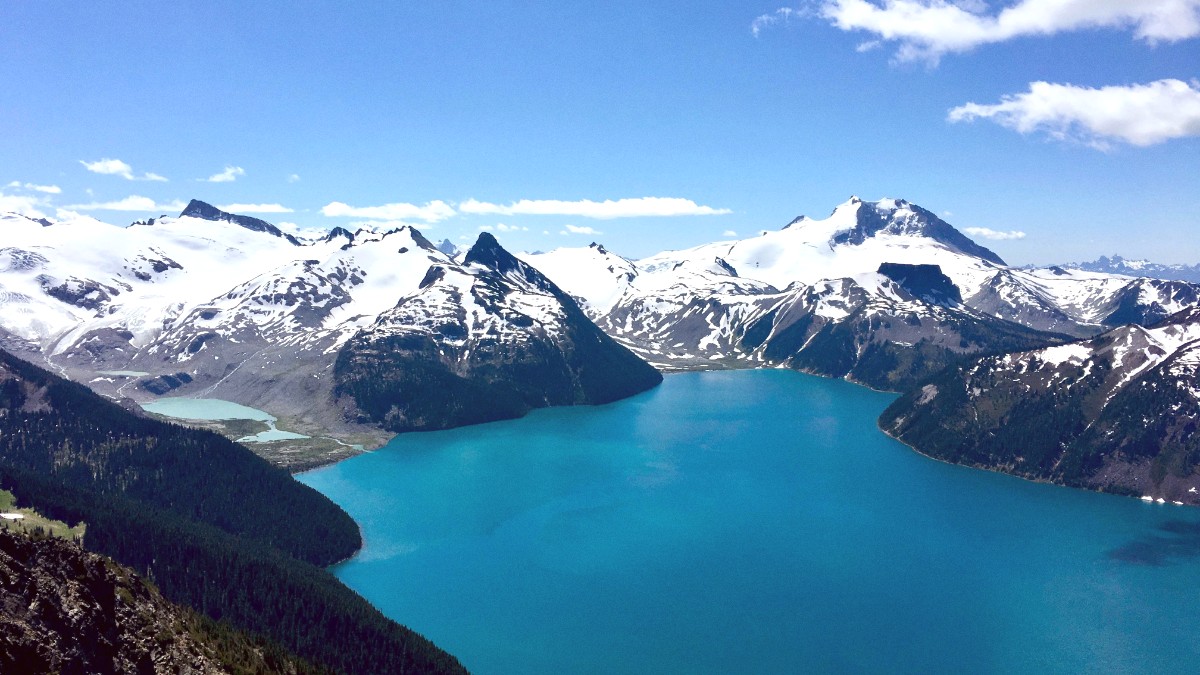
British Columbia, Canada
Winter (December-April): Village temperatures typically range from -5°C to 5°C (23°F to 41°F). Higher elevations see colder temperatures and heavy snowfall. Precipitation is common, appearing as snow at altitude and often as rain in the valley. Humidity levels remain high.
Spring (May-June): Temperatures rise to 10°C to 20°C (50°F to 68°F). Snow lingers on higher elevations, permitting spring skiing. Rain is frequent, especially in early spring.
Whistler's high season includes mid-December to March (winter) and mid-July to early September (summer). These times present optimal conditions and lively atmospheres, but with higher prices and dense crowds. Advance booking is strongly suggested.
Shoulder seasons (late April-June and September-mid December) mean lower prices and smaller crowds, with changing weather. Low seasons (mid-April to early May, late October to early December) have the lowest prices and minimal crowds, but fewer activity choices.
Mid-December to March
Optimal snow, full activity range, lively atmosphere.
Peak prices, dense crowds, advance booking critical.
Mid-July to Early September
Best weather for hiking and biking, many events.
Higher prices, presence of crowds.
Spring/Fall
Lower prices, smaller crowds, transitional activities.
Variable weather, some attractions may have limited hours.
Heavy snowfall sometimes closes the Sea-to-Sky Highway, the main road to Whistler. Rain in the valley can mean snow on the mountain, so always check mountain-specific weather forecasts for conditions at higher altitudes.
Skiing/Snowboarding: January to March for peak conditions and consistent snow. Mountain Biking: July to September for dry trails. Hiking: Mid-July to September works well for alpine trails. Valley trails are accessible earlier and later in the season. Golf: May to September is the golf season. Sightseeing (Peak 2 Peak): Summer offers clear views, but the gondola operates in winter as well for mountain access.
January-March: Peak skiing/snowboarding.
July-September: Best for mountain biking and alpine hiking.
Peak 2 Peak Gondola runs summer and winter.
May-September: Enjoy Whistler's courses.
Variable weather, fewer crowds, lower prices.
Requirements vary by your nationality.
Citizens from visa-exempt countries (e.g., EU, Australia, New Zealand, most European nations) need an eTA if arriving by air. Apply online before your trip; it's a quick process.
Upon entry to Canada, present specific documents to a Canada Border Services Agency (CBSA) officer.
Canada uses the Canadian Dollar (CAD, or C$). Major credit cards are widely accepted. ATMs are readily available. Consider travel cards with no foreign transaction fees.
Whistler accommodates various budgets, from frugal to luxurious.
| Category | Budget Traveler (C$100-C$200) | Mid-range Traveler (C$250-C$500+) | Luxury Traveler (C$600+) |
|---|---|---|---|
| Accommodation | C$50-C$80 (hostel dorm, budget hotel/Airbnb outside village) | C$150-C$300 (standard hotel, condo, mid-range Airbnb in village/nearby) | C$400+ (luxury hotel, high-end condo, ski-in/ski-out) |
| Meals | C$30-C$50 (groceries, quick service, limited casual dining) | C$70-C$120 (mix of casual and some sit-down restaurants) | C$150+ (fine dining, gourmet experiences) |
| Transportation | C$0-C$10 (walking, local bus) | C$10-C$30 (local bus, occasional taxi/ride-share) | C$50+ (private transfers, taxis) |
| Activities | C$20-C$60 (limited, free hiking, low-cost activities) | C$50-C$100+ (lift tickets, rentals, tours, spa) | C$150+ (private lessons, heli-skiing, exclusive tours) |
Prioritize your health and safety during your Whistler visit.
Stay hydrated, limit alcohol, acclimatize slowly.
Use High-SPF sunscreen and wear UV-protective sunglasses.
Wear safety gear, adhere to trail signs, stay within skill level.
Dial 911 for Police, Fire, or Ambulance services (toll-free).
Whistler Health Care Centre provides urgent care (4380 Lorimer Road). For more serious conditions, Vancouver features major hospitals.
Tap water in Whistler is safe to drink. Canada maintains high food safety standards.
Whistler is safe with low crime rates; most incidents involve petty theft. Guard valuables.
Travel insurance is highly recommended. Look for policies covering medical emergencies, emergency evacuation, and trip cancellation/interruption.
Ensure your policy covers activities like skiing or mountain biking. Review World Nomads, SafetyWing, or Insubuy for options.
Look for policies that specifically include winter sports or extreme sports coverage if these activities are part of your plan.
Be aware of potential natural hazards and wildlife presence in the region.
Keep these important numbers accessible for any emergencies or inquiries.
Police, Fire, Ambulance: 911 (toll-free)
+1 (604) 932-4911
+1 (604) 932-3044